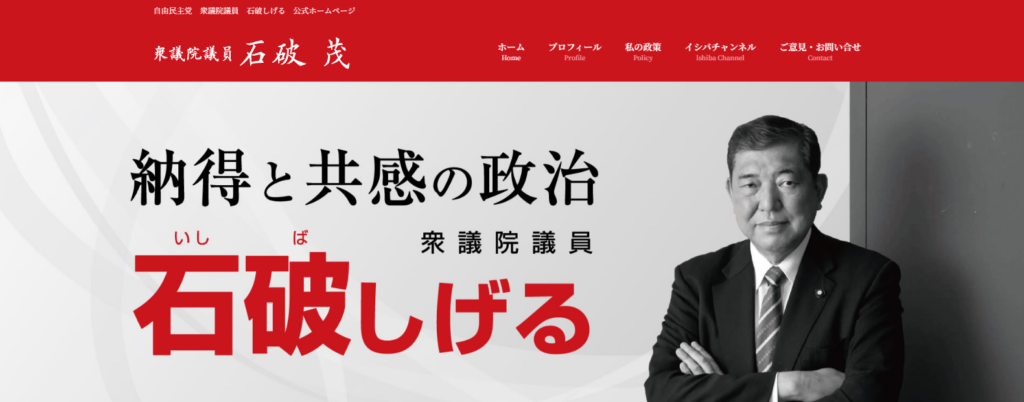After being elected as the new president of the Liberal Democratic Party, Prime Minister Shigeru Ishiba’s announcement of an early dissolution of the Diet drew sharp criticism from both the public and opposition parties. His sudden shift from his previous stance as a reformer was particularly surprising to many. The real reasons behind what seems to be a “U-turn” by Prime Minister Ishiba lie in the complex reality of politics and the compromises involved. In this article, we will explore the reasons behind Ishiba’s compromise and the hidden aspects of politics that drove his decision.
- 1. Compromise to Maintain His Power Base
- 2. Balancing Honor and Conviction: The Reality of Political Leadership
- 3. A Concrete Example of Compromise: Early Exercise of Dissolution Power
- 4. The Reality of Sticking to Convictions
- 5. Bending Conviction as a Strategic Decision
- The Challenges Ahead for Prime Minister Ishiba
1. Compromise to Maintain His Power Base
The primary reason behind Ishiba’s decision to opt for an early dissolution of the Diet was a compromise aimed at maintaining his power base and securing internal party support. During the LDP presidential election, Ishiba emphasized that he would dissolve the Diet after thorough debates in the National Assembly. However, in reality, he moved forward with an early dissolution, marking a significant shift in his stance, likely influenced by the internal dynamics of the party.
In the LDP, factions hold considerable influence, and even after becoming party president, Ishiba needed to negotiate with various factions to establish a stable power base. While maintaining his reformist stance could have resulted in clashes with conservative factions and vested interests, this would have made it difficult to govern effectively. By opting for an early dissolution, Ishiba chose to compromise and strengthen his power base by moving quickly to align with internal factions.
2. Balancing Honor and Conviction: The Reality of Political Leadership
Ishiba’s perceived bending of his convictions can be seen as a realistic decision to balance honor and conviction. For a long time, Ishiba positioned himself as a reformer, advocating for transparency in politics and challenging vested interests. However, as prime minister, he now faces the reality that governance requires numerous adjustments and compromises.
While it is essential for a politician to uphold honor and conviction, the reality of governance often demands pragmatic decisions. Had Ishiba completely adhered to his convictions, he risked losing internal support, which would likely have led to a short-lived administration. This scenario is common in Japanese politics, where stubborn adherence to convictions can result in significant political losses. Therefore, Ishiba likely chose to balance honor with the practical need to govern effectively, without sacrificing his status.
3. A Concrete Example of Compromise: Early Exercise of Dissolution Power
A specific example of Ishiba’s “U-turn” and the criticism that followed is the early exercise of his dissolution power. During the presidential election, Ishiba indicated that he would prioritize debates in the National Assembly before calling a general election. However, immediately after becoming party president, he announced plans to hold the election as soon as possible, without allowing for thorough debate.
This move sparked strong criticism, especially from opposition parties and the public, who had hoped for reform. Ishiba’s decision was seen as an early abandonment of the convictions he had shown during the presidential campaign, leading to accusations of inconsistency. Opposition parties, such as the Constitutional Democratic Party and the Japanese Communist Party, viewed this as a “betrayal of the people,” escalating their criticism of Ishiba for abandoning his principles.
4. The Reality of Sticking to Convictions
What would have happened if Ishiba had fully stuck to his convictions? If he had maintained his reformist stance and prioritized debates in the Diet, standing firm against internal and external criticism, he might have been seen as a “politician who upheld his convictions,” and could have earned high praise from the public. Japan’s political history includes many examples of short-lived administrations led by politicians who were later reassessed favorably for adhering to their beliefs.
However, the reality is that sticking to his convictions would have likely resulted in a loss of internal support, significantly diminishing his ability to implement policy. Japan’s LDP is deeply rooted in factional politics, and stable governance requires internal support. Had Ishiba fully adhered to his convictions, he would likely have become isolated within the party, leading to a short-lived administration. This, in turn, would have severely diminished his political influence, making it difficult to carry out the reforms he had proposed.
5. Bending Conviction as a Strategic Decision
Ishiba’s perceived bending of his convictions can also be viewed as a necessary compromise from a strategic standpoint. While Ishiba has long positioned himself as a reformist within the LDP, the reality of being prime minister requires broad support within the party to govern effectively. His decision for early dissolution can be seen as a strategic move to secure that support.
Additionally, from a short-term perspective, the early dissolution may have been a calculated move to catch the opposition off guard, making the election more favorable for the LDP. However, whether this decision was a strategy to regain public trust is questionable. Many of the public had hoped Ishiba would adhere to his reformist convictions, and his abrupt shift has led to widespread skepticism.
The Challenges Ahead for Prime Minister Ishiba
While there is no shortage of criticism for Ishiba’s perceived “U-turn,” it is also true that he faces the complex task of stabilizing his leadership and governing effectively as prime minister. Moving forward, it will be critical for Ishiba to demonstrate how he plans to regain the public’s trust and balance his leadership with the realities of governance.
The public’s expectations for reform remain high. How Ishiba reconstructs his convictions and delivers on the policies expected of him will ultimately determine his political future. In a political landscape where it is difficult to fully adhere to one’s beliefs, the way in which Ishiba navigates the balance between honor and conviction will be a key test of his leadership.





コメント